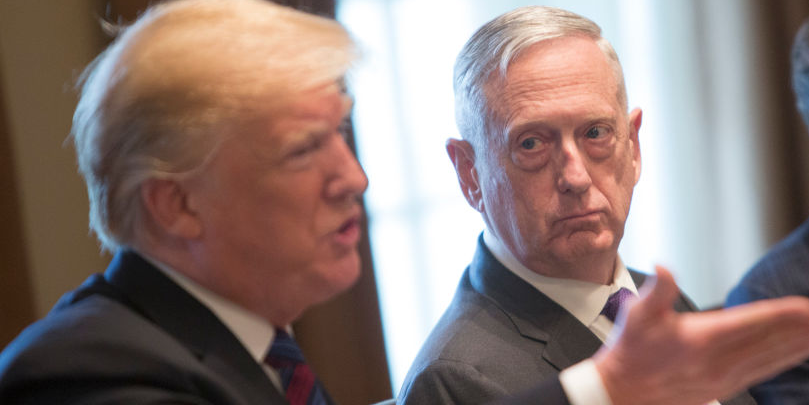- US Defense Secretary James Mattis wanted to approach strikes on Syria with far more caution than President Donald Trump.
- Mattis’ measured approach was recorded in public comments this week as well as in a number of high-profile leaks.
- According to a defense expert, Mattis’ team may have used leaks because they “want the record to show” he wanted to proceed with caution in Syria.
- Mattis is concerned that aggressive action against Syria could cause chaos or military action by Russia or Iran against US troops.
US Defense Secretary James Mattis may have used leaks about strikes on Syria to distance himself from President Donald Trump and potentially negative fallout from Friday’s US-led military action.
On Friday, The Wall Street Journal reported Mattis was resisting Trump’s desire for sweeping strikes on Syria and successfully halted two potential attacks earlier this week. The Journal also said Mattis wanted “a more limited action that wouldn’t risk a wider confrontation with Russian forces.”
CNN and the The New York Times also reported that Mattis warned Trump, in a meeting with military officials on Thursday, that an aggressive response in Syria would risk escalating US involvement.
The information was told to reporters by defense and US officials, which may have been a strategy from Mattis’ team, according to experts.
Leaks about the defense secretary's pushback "may mean that Secretary Mattis is losing the battle with the White House and those around him want the record to show that he favored more caution," Nicholas Heras, a defense fellow at the Center for New American Security, told The National.
Mattis may be separating himself from the strikes in case it leads to Russia or Iran attacking the 2,000-strong US troops in Syria or chaos ensuing from a potential collapse of Assad's regime, said Heras.
Mattis also indicated his desire to proceed with caution during public comments to the House Armed Services Committee on Thursday.
"We are trying to stop the murder of innocent people," Mattis said. "But on a strategic level, it's how do we keep this from escalating out of control - if you get my drift on that."
Until recently, Mattis' more cautious approach to foreign policy was often backed by Secretary of State Rex Tillerson. But with Tillerson now gone, and with a far more hawkish national security adviser in John Bolton, Mattis likely found fewer allies in convincing Trump to proceed with caution.

